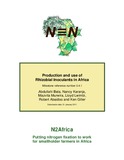Production and use of Rhizobial inoculants in Africa

View/
Date
31-01-11Author
Bala, Abdullahi
Karanja, Nancy
Murwira, Mazvita
Lwimbi, Lloyd
Abaidoo, Robert
Giller, Ken
Type
Technical ReportLanguage
enMetadata
Show full item recordAbstract
Inoculation studies have been conducted in Africa since the 1950s and the benefits of
inoculation of legumes with suitable rhizobial strains have been amply demonstrated. Despite
the clear evidence of response to inoculation by legume crops, there is relatively little use of
inoculants by smallholder farmers in sub-Saharan Africa. Several programmes aimed at
promoting the use of inoculants in smallholder farms have been supported by national
governments, especially in East and southern Africa (e.g. Malawi, Zambia and Zimbabwe).
Such programmes were often run with funding from international agencies, such as the Food
and Agricultural Organisation (FAO), United Nations Educational, Scientific and Cultural
Organisation (UNESCO) and the International Atomic Energy Agency (IAEA). While the
projects lasted, some increase in inoculant use was often recorded. However, the scale of
adoption declined once the projects came to an end. The various regions within sub-Saharan
Africa have had varying degrees of success in promoting inoculant production and use. Table
1 shows some of the existing inoculant plants and their capacity. Some of the problems
identified for the lack of sustainability of inoculant production in Africa include poorly
developed marketing channels, inadequate quality assurance as well as inadequate capacity
within the extension sector.
Citation
Abdullahi Bala, Nancy Karanja, Mazvita Murwira, Lloyd Lwimbi, Robert Abaidoo and Ken Giller, 2011 Production and use of Rhizobial inoculants in Africa, www.N2Africa.org, 21 pp.Publisher
College of Agriculture and Veterinary Sciences, University of Nairobi
Description
Project report
Collections
- Faculty of Agriculture [226]
